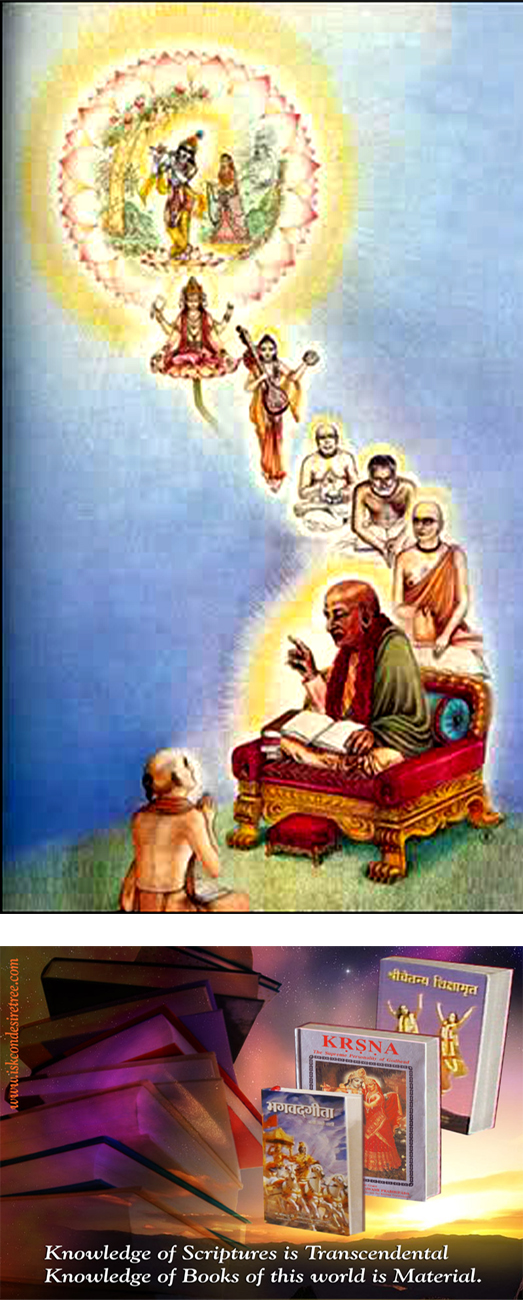
About ISKCON

What is the Hare Krishna Philosophy?
The term "Hare Krishna", or The Hare Krishna Movement Organization, formally The International Society for Krishna Consciousness (ISKCON), is the orthodox core of Hinduism. It was registered in the West (in New York) in July 1966, but dates back over 5000 years. Lord Chaitanya Mahaprabhu (1486-1532) popularized the movement all over India. Hinduism is the world’s third largest religion with over 900 million adherents, second to Christianity and Islam (according to various leading encyclopedias, websites and almanacs). The principal scriptures are The Bhagavad-gita (The Song of God), and the Shrimad Bhagavatam (the story of the Personality of Godhead Shri Krishna Bhagavan). Hare Krishnas believe in one God.
ISKCON follows the teachings of the Vedas and the Vedic scriptures, includingBhagavad-gita and the Bhagavata Purana; it teaches and practices Vaishnavism, or devotion to God in the supreme personal aspect of Radha Krishna. ISKCON receives these teachings through the preceptorial line known as the Brahma Madhva Gaudiya sampradayaThis well established traditional line descends through the respected teacher Sri Caitanya Mahaprabhu (AD 1486– 1534), the full incarnation of Sri Krishna, whose philosophy and practices unify the teachings of all four major Vaishnava Acharyas: Sri Madhvacharya, Sri Ramanujacharya, Sri Vishnuswami, and Sri Nimbarkacharya.The International Society for Krishna Consciousness (ISKCON), also known as The Hare Krishna Movement™ Organization,was founded by His Divine Grace A.C. Bhaktivedanta Swami Prabhupada. ISKCON embraces the chanting of the holy name of Krishna as a primary practice and accepts the concepts of transmigration, karma, vegetarianism (ahimsa), worship of the deity (Shri Vigraha), and the preceptor-disciple (guru- sishya) relationship. Initiated members vow to refrain from gambling, illicit sex, intoxicants (including coffee, tea, and cigarettes), and non vegetarian food. In this way ISKCON faithfully continues the core traditions of the Hindu faith. ISKCON’s teachings are non sectarian and non denominational, for they are not limited to any particular historical religion. Vaishnavism inculcates the essential and universal principle of all religion. That principle, called sanatana dharma, denotes the natural and eternal activity of all living beings, loving devotional service to the one Supreme Personality of Godhead.

The basic Hare Krishna beliefs can be summarized as follows:
1. By sincerely cultivating true spiritual science, we can be free from anxiety and come to a state of pure, unending, blissful consciousness in this lifetime.
2. We are not our bodies but eternal, spirit souls, parts and parcels of God (Krishna). As such, we are all brothers, and Krishna is ultimately our common father. We accept the process of transmigration of the soul (reincarnation).
3. Krishna is eternal, all-knowing, omnipresent, all-powerful, and all-attractive. He is the seed-giving father of all living beings, and He is the sustaining energy of the entire cosmic creation. He is the same God as The Father Allah, Buddha and Jehovah.
4. The Absolute Truth is contained in the Vedas, the oldest scriptures in the world. The essence of the Vedas is found in the Bhagavad-gita, a literal record of Krishna's words.
5. One can learn the Vedic knowledge from a genuine spiritual master -- one who has no selfish motives and whose mind is firmly fixed on Krishna.
6. Before one eats, one offers to the Lord (Krishna) the food that sustains all humans; then Krishna becomes the offering and purifies the offered.
7. One performs all actions as offerings to Krishna and does nothing for one's own sense gratification.
8. The recommended means for achieving the mature stage of love of God in this age of Kali, or quarrel, is to chant the holy names of the Lord. The easiest method for most people is to chant the Hare Krishna mantra:
Hare Krishna Hare Krishna Krishna Krishna Hare Hare Hare Rama Hare Rama Rama Rama Hare Hare.
Founder’s Statement
Kolkata-born A.C. Bhakitivedanta Swami (1896-1977), also known as Shrila Prabhupada, who founded The Hare Krishna Movement in New York in 1966, wrote a statement that was used in the religion’s initial incorporation. This statement is still relevant for ISKCON, and sometimes serves as a Mission Statement.
It reads as follows:
1. To systematically propagate spiritual knowledge to society at large and to educate all people in the techniques of spiritual life in order to check the imbalance of values in life and to achieve real unity and peace in the world.
2. To propagate a consciousness of Krishna (God), as it is revealed in the great scriptures of India, especially Bhagavad-gita and Srimad-Bhagavatam. We accept the principle of transmigration of the soul (reincarnation).
3. To bring the members of the Society together with each other and nearer to Krishna, the prime entity, thus developing the idea within the members, and humanity at large, that each soul is part and parcel of the quality of Godhead (Krishna).
4. To teach and encourage the sankirtana movement, congregational chanting of the holy name of God, as revealed in the teachings of Lord Sri Caitanya Mahaprabhu.
5.To erect for the members and for society at large a holy place of transcendental pastimes dedicated to the personality of Krishna.*
6. To bring the members closer together for the purpose of teaching a simpler, more natural way of life.
7. With a view towards achieving the aforementioned purposes, to publish and distribute periodicals, magazines, books and other writings and to create websites that help realize these purposes.
